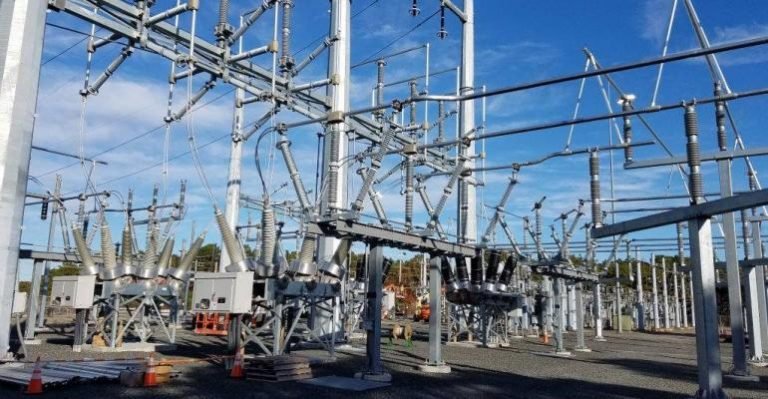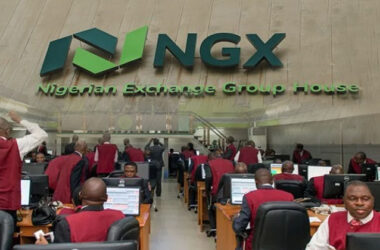By Godwin Anyebe
The industrial growth of Aba, Abia State, is facing significant challenges as the city’s primary power supplier, Aba Power Limited, struggles with a crippling shortage of natural gas. This shortage is severely impacting the ability of Geometric Power Limited, which operates the Aba Integrated Power Project, to deliver reliable electricity to the region’s businesses and residents.
Since the inauguration of the $800 million power plant earlier this year, the promise of uninterrupted power supply has been hindered by unreliable gas supplies. The plant, which has the capacity to generate 188 megawatts of electricity, is currently operating far below its potential, leading to frequent power outages that threaten the economic activities in the region.
Despite having three General Electric (GE) turbines capable of generating 141 megawatts, Geometric Power is forced to import a mere 25 megawatts from the Niger Delta Power Holding Company (NDPHC) at a significant cost. This measure, while costly, has become necessary to keep the lights on in the commercial hub of Aba, which relies heavily on stable power for its industrial activities.
The gas supply issues stem from challenges faced by local operators who took over oil and gas assets from Shell Petroleum Development Company (SPDC). The new operators have struggled to meet the supply agreements originally made by Shell, delivering less than 10 million standard cubic feet (SCF) of gas daily, a fraction of what is required to fully power the plant.
The ongoing gas shortage not only jeopardizes Aba’s industrial growth but also threatens to derail the region’s economic development. Manufacturing firms in the area, which depend on consistent electricity, are particularly hard-hit, facing increased operational costs and decreased productivity.
As Geometric Power scrambles to secure alternative gas supplies, there are growing concerns that without immediate intervention, the broader economic aspirations for the region may falter. The federal and state governments, alongside industry stakeholders, are under pressure to find a long-term solution to ensure that the Aba Power Project fulfills its promise as a catalyst for industrial growth in the Southeast.
The situation in Aba underscores the critical role of infrastructure in economic development and serves as a stark reminder of the challenges that can arise when key energy projects are hampered by resource shortages. With the region’s future hanging in the balance, all eyes are on the efforts to resolve the gas supply crisis and restore confidence in the region’s power stability.
Speaking on this delima of Aba power, Joseph Chidi, an Energy Expert said; “the gas supply crisis facing Aba Power is a stark reminder of the critical gaps in Nigeria’s energy infrastructure. This situation highlights the broader issue of our country’s dependency on unreliable gas supplies for power generation, particularly in industrial hubs like Aba.”
According to him, “Aba Power’s struggle to secure consistent gas supplies underscores a significant vulnerability in Nigeria’s energy sector—an over-reliance on a few gas suppliers who themselves are dealing with infrastructural and operational challenges. When a project as significant as the Aba Integrated Power Project, designed to fuel industrial growth, is hamstrung by such issues, it sends a concerning signal about the future of energy security in Nigeria.”
“This crisis has a direct impact on industrial growth, not just in Aba, but potentially across the Southeast region. Manufacturing firms, which are the backbone of Aba’s economy, are dependent on reliable power. The current gas shortage not only increases their operational costs but also stifles their ability to compete in a global market where energy efficiency is key.” He noted.
The situation, according to him, calls for an urgent reevaluation of our energy strategy. We need to diversify our energy mix and invest in alternative energy sources like renewables, which can complement our gas supplies. Additionally, improving the reliability of gas infrastructure and ensuring that local operators can meet their supply commitments are essential steps to prevent such crises in the future.
In the short term, he said, “it is crucial for stakeholders—including the federal government, state authorities, and private sector players—to collaborate and find a solution to this gas supply issue. Without swift action, the economic aspirations tied to the Aba Power Project could be severely undermined, setting back the region’s industrial growth for years to come.”
Chidi’s analysis paints a dire picture of the immediate risks and long-term implications if the gas supply issues are not addressed. It also calls for strategic changes in Nigeria’s approach to energy security, particularly in regions poised for industrial expansion.
Also speaking, Olalekan Olaiya, an Energy Expert said; “the situation unfolding at Aba Power is a classic example of how a single bottleneck—like gas supply—can have far-reaching consequences across multiple sectors. This crisis not only impacts electricity generation but also has a cascading effect on the industrial growth of the entire region.”
From my analysis, the core of the issue lies in the fragility of Nigeria’s gas supply chain. The transition from major operators like Shell to local players in the gas supply market was intended to bolster local content, but it has inadvertently exposed us to risks we were unprepared for. These local operators are struggling with infrastructure and resource management, leading to the current supply shortfalls that are crippling Aba Power’s operations. He added.
According to him, “for Aba, this is a critical blow. The city has long been recognized as an industrial hub, with its economy heavily reliant on manufacturing. Reliable power is the backbone of manufacturing; without it, productivity drops, operational costs rise, and businesses are forced to scale back or even shut down. The knock-on effect on employment and the local economy could be devastating.”
“In the short term, there needs to be an immediate intervention to stabilize gas supplies, perhaps through strategic reserves or temporary importation to bridge the gap. However, in the long term, Nigeria must diversify its energy mix. Relying almost exclusively on gas is a risk we can no longer afford. Investments in alternative energy sources such as solar, wind, and even coal, as a stop-gap measure, should be explored to provide a buffer against such disruptions.” He explained.
Furthermore, he continued, “improving the gas supply infrastructure and ensuring that local operators have the capacity and reliability to meet their obligations is essential. This could involve public-private partnerships, where the government provides the necessary support to ensure that these operators can maintain consistent supply.”
He pointed out that, “the Aba Power crisis should serve as a wake-up call for policymakers and industry stakeholders. Without addressing these systemic issues, we risk stalling not just Aba’s industrial growth, but the broader economic development goals of Nigeria.”
To address this, the management said that it was exploring alternative arrangements to secure backup supplies, to ensure a more reliable energy provision, even if current supply agreements face disruptions.
The firm expressed concerns over the severe shortage of natural gas supply to its 188-megawatt plant in the Osisioma Industrial Estate in Aba, Abia State, stating that it is hindering the state’s economic growth.
Recall that Bart Nnaji, a professor and chairman of Geometric Power Group, at the inauguration of the power plant on February 26, 2024, warned that lack of gas would be the only obstacle to providing constant power in the commercial city.
Ugo Opiegbe, managing director, Aba Power Limited Electric (APLE), an electricity distribution arm of Geometric Power Group, explained that the firm has been constrained to import 25 megawatts from the Niger Delta Power Holding Company (NDPHC) at a huge cost, just to ensure that its customers have supplies, no matter the cost to the company.
Opiegbe said that it was a supreme irony that though the firm is ready to generate 141MW from its three General Electric (GE) turbines and provide uninterrupted, quality, and affordable electricity to nine of the 17 Local Government Areas in Abia State and export some 50MW potential excess power to the national grid, to make power more available to other places in Nigeria, but is still importing electricity, because of the grave gas constraints.
He noted that the Aba Ringfence needs about 90MW, which Geometric can generate from two of its installed three turbines, each with a capacity of 47MW.
“Therefore, the 25MW from the NDPHC is like a drop of water in the ocean,” he said.
According to him, “The unreliable gas supply is affecting hundreds of thousands of our customers, particularly manufacturing firms for whose sake Geometric Power built the $800m Aba Integrated Power Project, to accelerate the industrial development of Aba and its environs and serve as a model of electricity development in Nigeria, a promising nation whose growth has been hampered seriously over the decades by the absence of such basic infrastructure, as reliable power.”
Regarded as the biggest private sector investment in the Southeast, the Aba power integrated project was commissioned in February 26, by Vice President Kashim Shettima on behalf of President Bola Tinubu.
According to Ogbonna Chukwueke, an engineer and gas expert, who used to be a Shell executive, Geometric Power signed an agreement with The Shell Petroleum Development Company (SPDC) in 2009 for the supply of 43 million standard cubic feet of gas (MSCF) from its Oil Mining Licences (OMLs) 11 and 17 in Owaza, Ukwa East Local Government Area of Abia State, for its four turbines to produce 47MW each.
The former Shell engineer, who is now a petroleum consultant in Lagos, however, noted that the withdrawal of the petroleum giant from Nigeria’s onshore and shallow offshore operations following years of massive oil theft, vandalism against its facilities, community issues, and kidnapping of its officers for ransom by criminal gangs led to the transfer of the ownership and management of the OMLs 11 and 17 to local operators “who unfortunately, have not been able to deliver even up to10-million SCF daily to the power plant.”
But Geometric Power has disclosed that it was working “frantically to resolve the gas supply challenge,” acknowledging what it described as the wonderful and patriotic efforts of Vice President Shettima, Governor Alex Otti, Adebayo Adelabu, minister of Power and Mele Kyari, group managing director, Nigerian National Petroleum Company Limited (NNPCL), in assisting to get a more reliable source of gas to the power plant.
Geometric Power Limited, through APLE, has continued with its metering programme, geared towards metering all customers within its ring-fence area.
This effort is supported by Meter Asset Provider (MAP) scheme, which allows the customers to pay for their meters and get refunded, by monthly deductions from their monthly bill, and the Aba Power Mass Metering Programme, which is vendor-financed and is carried out feeder by feeder, to ensure proper energy accountability.
The two key programmes were approved by the Nigerian Electricity Regulatory Commission (NERC).
So far, the firm has successfully installed 11,859 meters under the MAP scheme, 19, 212 meters, through the mass metering programme and 452 distribution substation (DSS)/maximum demand (MD) meters.
The areas now metered include, Township 11 kV feeder, Aba East 11 kV feeder, Ehi Road 6.6 kV feeder, World Bank 11 kV feeder and IGI 33 kV feeder.
Additionally, the Umuchichi segment of the Owerrinta 33 kV feeder has been metered.
Opiegbe explained that the end-to-end metering programme, when completed, would reduce overall losses within the electricity distribution network, ensure efficient recovery of payment arrears and significant reduction in aggregate technical, commercial, and collection (ATC&C) losses.
He also noted that it would reduce technical losses, due to reduced transformer overloading and incidences of transformer failures, which improves service reliability.
For electricity consumers, he said that the metering programme would ensure that they receive bills based on actual electricity consumption and eliminate issues associated with estimated billing.









